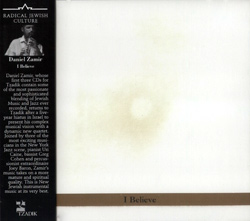
As Daniel Zamir would have it, his fourth full-length, I Believe is an expression of the presence of the Gods within us; faith as an involvement with others in a venture into risk. Rapt with the power of renunciation, Zamir, Joey Baron, and Uri Caine give themselves over to a process of waiting, to an asceticism concerned less with a pious show of unmasking, and more with a reduction to necessity, to an exchange foreign to economy, but intimate with immediacy, whereby one can identify and identify with the other, not only on a personal but also musical level.
At least to a point, then, I Believe is a transcription of such Jewish tenets of belief into musical form. But it's also a decorative display: the players tend toward an expansive rendering of motifs fundamental to the Jewish music tradition. Consequently the recordings are defined as much by Zamir's spirituality as by Baron's global approach to rhythm and Caine's Chicago traditionalism.
One finds this clearly and concisely expounded in "Poem 54 (770)", with its modal groove underpinned by rolling basslines, over which Zamir saxophone expels lengthy, discursive solos. The piece reflects perfectly the solid vibrancy and creative interplay that exists between these players.
Later, as this conversation continues, the synthesis of classical form and jazz freedom that is particularly evident in the playing of pianist Uri Caine is accomodated to and gradually embodied by the others to inspirational effect. On "Poem 10", for instance, an increasingly ferocious block chord barrage set up by Caine is separated by Zamir's saxophone passages, each eventually accompanied by Cohen's evocative bass. And it is here that the album is at its best, as a revealing dis-equilibrium, when ideas are hammered out, developed slowly and explored thoroughly, allowing those on hand to, at the same time, experiment a little without any circumspect pressure to arrive at a definitive conclusion. It's when the end in view is groped at eagerly, as it is on occasion, that all this dissipates and the sound becomes too neat and effective. Inasmuch as one can't but admit that the records power is to be found in its simplicity and spirituality, there are places where it ought to have become more sophisticated.
Comments and Feedback:
|



